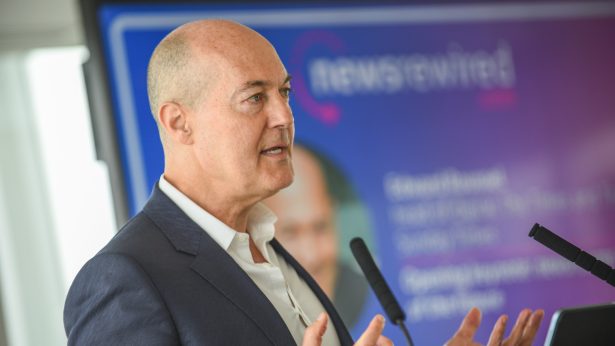If you were in the conference hall for news:rewired‘s sessions earlier in the day, you will have heard from several publishers and experts that niche works: restricting editorial coverage to an interest, area or industry and building a real community is a sound publishing strategy.
So what comes next? What works? Here are some snapshot views to round off the news:rewired day….
Permanently out of office
Hannah Waldram, one of the Guardian’s first “beatbloggers” covering Cardiff for the Guardian Local, spoke about how she runs her one-woman, officeless Cardiff blogging empire. In terms of hardware: laptop, smartphone, small digital camera and audio recorder pretty much covers it.
As for software and news sources, Waldram uses Google Reader, Twitter, live video streaming service Bambuser, live-blogging tool Cover it Live, audio editing software Audacity, Audioboo, Scribd… the list goes on. All of these are free, online, connected tools that were unthinkable a few years ago but are now becoming a standard part of the digital journalist’s armoury.
Playing the news game
Phillip Trippenbach, an interactive producer and games designer, has an idea that sounds odd to some, but he also has a compelling argument to go with it: “Video games are the future of journalism,” he declared, to a somewhat sceptical crowd.
As it stands, news is constructed into “stories” but “stories have problems – for a story you need a narrative, you need a location, you need facts.”
He mentioned Budget Hero, a game built by American Public Media that puts players in the shoes of the US government and challenges them to draw up a mini financial plan (play it here). “It’s built on the data that’s available from the US Treasury every year. You want to know how the budget works? OK you balance it.”
This is not as trival an argument as it might at first sound. Newspapers and freedom of speech campaigners have met success in getting governments to release data. So how do you then present it? A really big table? Or how about something different…
It’s important for us to realise that games are a medium just like text and pictures. As complex data sets become more and more available, the interactivity around it becomes more important – video games are a great way of doing that.
Innovate or die!
Kevin Anderson, who recently left the Guardian to go freelance after holding several senior digital roles there, added a vote of confidence to Trippenbach’s games argument, saying: “As long as the atomic unit of journalism is the story, then we are missing many commercial opportunities.”
Someone that knows a thing or two about how to make innovation work in newsrooms, Anderson warns editors and publishers to be wary of anyone that thinks there’s an easy way out of the problems that news titles face. “There’s no easy answer – anyone that tells you that, fire them. Or just don’t hire them. But there are easy wins.
“It’s 2010, we should be a lot further along then we are now… In 2008 (during the US presidential election), for most of the time my main newsgathering tool was my phone.” He adds that his reports and tweets while covering that campaign were geo-tagged, something still not standard across the industry.
But it’s not just about journalists, he says: “The lack of innovation is not just in the newsroom it’s also in the commercial department. The FT is doing some of the most innovative commercial stuff around – like a daypass to go behind the paywall given away through Foursquare check-ins.
“The economic imperative is there but where is the innovation… too many times it’s about ‘who owns the future’. We still have a culture internally that says ‘if I don’t own this, we won’t do it.’ If we don’t get past this news organisations will die.”

